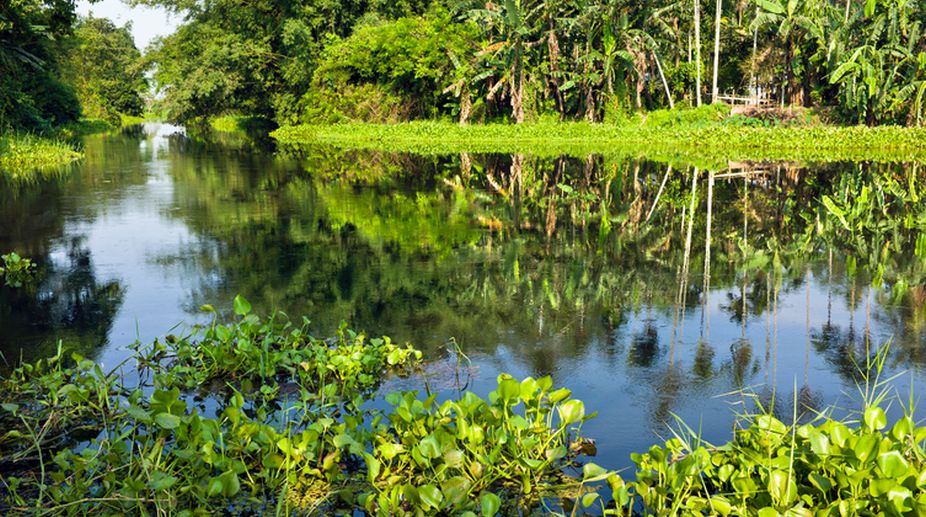PM Modi on 3-day visit to 3 states–MP, Bihar, Assam–from Sunday
According to the Prime Minister’s Office (PMO), the Prime Minister will visit Madhya Pradesh, Bihar and Assam from February 23-25.

A lagoon at Majuli Island in Assam (PHOTO: Getty Images)
Majuli, the world's largest inhabited river island, is famous for the many features unique to it — the Neo-Vaishnavite "Satras" (institutional centres) dating back to the 15th century, the colourful yet simple lifestyle and culture of the Mising tribe, the art of mask-making, and the even more ancient art of pottery practised by villagers.
It was a dilemma for a wandering tourist to decide what to see and what not to until Root Bridge, an advocacy group for ethical and responsible travels, recently launched a novel initiative called "Majuli on Cycle" to present to the visitors the soul of the river Island as it exists.
Advertisement
Designed as a cultural immersion initiative by Root Bridge, in association with the Assam Tourism Development Corporation (ATDC) and ESAF, the microfinance institution, Majuli on Cycle not only presented the soul of Majuli to a group of visitors this Rongali Bihu but also became the first such curated carbon-free story-telling tour ever conducted in the river island.
Advertisement
At least 25 people, including domestic and foreign tourists, took part in Majuli on Cycle — a day-long cycle ride to visit a Mising village to experience the life and culture of the tribe, an agriculture farm to see agricultural practices in one of the largest deltas in the world, to try their hands at the ancient art of mask-making at Chamaguri Satra and also to witness potters at Salmora village.
"This is a novel idea. The cycle ride was exotic. We enjoyed every minute. It's a great initiative and we were able to know the life of people of Majuli, its culture, art, history and about the heritage of the island in a single day," said Dominik, a tourist from Germany, who participated in the initiative conducted on the first day of Rongali Bihu (April 14).
This Root Bridge-introduced carbon-free storytelling tour in the island aims to set a benchmark for "Thoughtful Travel" in the world's largest river island.
"Unlike a regular tour, the organisers took us through offbeat roads and the bicycle was the mode of travel. Accompanied by the 'storytellers' of Root Bridge, we rode on the bicycle through paddy fields, crossed a rivulet and a river bed, witnessed and enjoyed the farming practices of the people in the island," said Stephinie, another tourist from Germany.
"We also witnessed the art of mask-making at Chamaguri Satra, which is one of the main attractions for tourists in the island, and saw locals in Salmora village making pottery without using a potter's wheel… It's interesting," Stephinie added. Some say Salmora pottery is much like Harappan pottery.
Majuli Superintendent of Police (SP) Vaibhav Nimbalkar flagged off the maiden Majuli on Cycle ride.
"Cycle is the best way to explore this beautiful river island. Root Bridge's initiative will help tourists experience Majuli in a better way. I wish more people explore the island using the carbon-free ride," said the SP while appreciating the Root Bridge initiative.
Root Bridge storytellers also took the tourists to a Mising village, so that they could participate in the ancient ritual of bathing the cattle on the first day of Rongali Bihu, which is called "Goru Bihu". "It's a wonderful feeling to experience the local culture in the company of locals," Stephinie added.
The tourists were then taken to an agriculture farm where they saw the agricultural practices followed by the locals. The tourists were welcomed in the village with a Mising Bihu dance and Dhol (a traditional drum-like musical instrument) performance by the villagers to give them a slice of Mising culture.
All the programmes were specially curated for the visitors to showcase the life and culture of the Mising community.
In the evening, the tourists were taken to the river bank to have the magnificent view of sunset over the mighty Brahmaputra river. As they? enjoyed the breathtaking sunset view, a musical "jugalbandi" (fusion) of Pepa, Gagana (traditional musical instruments played during Bihu songs), and Bihu song and dance was also performed by rural artistes.
"Root Bridge wants to create a benchmark for thoughtful travel in Majuli. Majuli has a character and a soul. This should be preserved. We are against mass tourism. We will introduce a curated storytelling cycle tour in Majuli on daily basis, which will help both travellers and host community," said Root Bridge founder Javed.
"We are so happy and overwhelmed by the government's positive gesture for our humble project," he added.
The organisation also awarded Root Bridge Annual Award 2017 to the veteran exponent of Dhol, Bogai Bora Ojah, for his contribution towards highlighting the culture of Majuli in particular and northeast India in general.
"The Root Bridge award is instituted to honour some of the unsung heroes of northeast India. This is the first year. In fact we felt honoured to honour Bogai Bora Ojah, who had been contributing immensely towards the culture of the island and northeast India as a whole, which has indirectly helped travel and tourism industry," Javed said.
The Annual award would be conferred upon one such unsung heroe of the region every year, Javen added.
(IANS)
Advertisement